Tuesday Triage #34
- TUESDAY TRIAGE #34 by Vadim Drobinin
- On desserts
- Sea-buckthorn mousse cake
- Matcha mousse cake
- Things I enjoyed reading
- 1. Excel Never Dies by @packym
- 2. The blissful political incorrectness of Soviet comedies by R J Markowski
- 3. When the Barbizon Gave Women Rooms of Their Own by @cncep
- 4. Raspberry PI for Kill Mosquitoes by Laser by Ildar Rakhmatulin
- 5. When did writing in major newspapers become so bad? by Branko
- 6. The Most-Used Mathematical Algorithm Idea in History by @stephen_wolfram
- 7. When The Prison Banned Board Games, We Played Chess In Our Minds by Harlin Pierce
- 8. Paying my bills with 'free' ebooks by @learn_byexample
- 9. Treasure Out of the Bog by nrhiller
- 10. Notes from a year of building keyboards by @lynaghk
- Things I didn't know last Tuesday
- 1. Milton Keynes streets
- 2. Hagfish slime
- 3. It's illegal to charge for toilets in the USA
- 4. Vintage Market of Pugliano
- 5. Koreans predict personality by blood type
- 6. The Willy Wonka Candy Company
- 7. Beer taxation
- 8. Talking with your hands alters the perception of your words
- 9. Maxwell’s gambling demon
- 10. Hershey Creamery Company
- Book of the week
- Thank you and see you in a week!
TUESDAY TRIAGE #34
by Vadim Drobinin ¶
Your weekly crème de la crème of the Internet is here!
09.03.2021 (read in browser)
On desserts ¶
I keep a note in Notes app with everything I want to cook eventually.
Most of the items on the list belong to one of the two categories: either something I didn't eat in a while, or something I want to learn how to cook.
The latter obviously is more compelling, and yet not always more challenging.
However, this week's adventure was more challenging than I expected.
First, because I've been postponing this particular idea for a while as it required a plenty of kitchenware I didn't yet posses.
Second, because I didn't have a recipe to follow per se, and had to come up with my very own combination of flavours and decorations.
Third, because there is a limit to how many sweets one can eat, and over the last month I overdid it by a lot, strolling through "bean-to-bar" chocolate, white miso brownies, and croissants.
As a result, it took me almost three weeks to finally make it to the plate, and I am rather happy with the outcome. Behold, two sets of mousse desserts.
Sea-buckthorn mousse cake ¶
I grew up eating sea-buckthorn straight from a tree, and still love these berries dearly. They grow in the UK too, although mostly in England, and yet are hard to find in groceries, but I managed to source some frozen ones in a Russian shop, and then defrosted and turned into a purée, used for the filling:
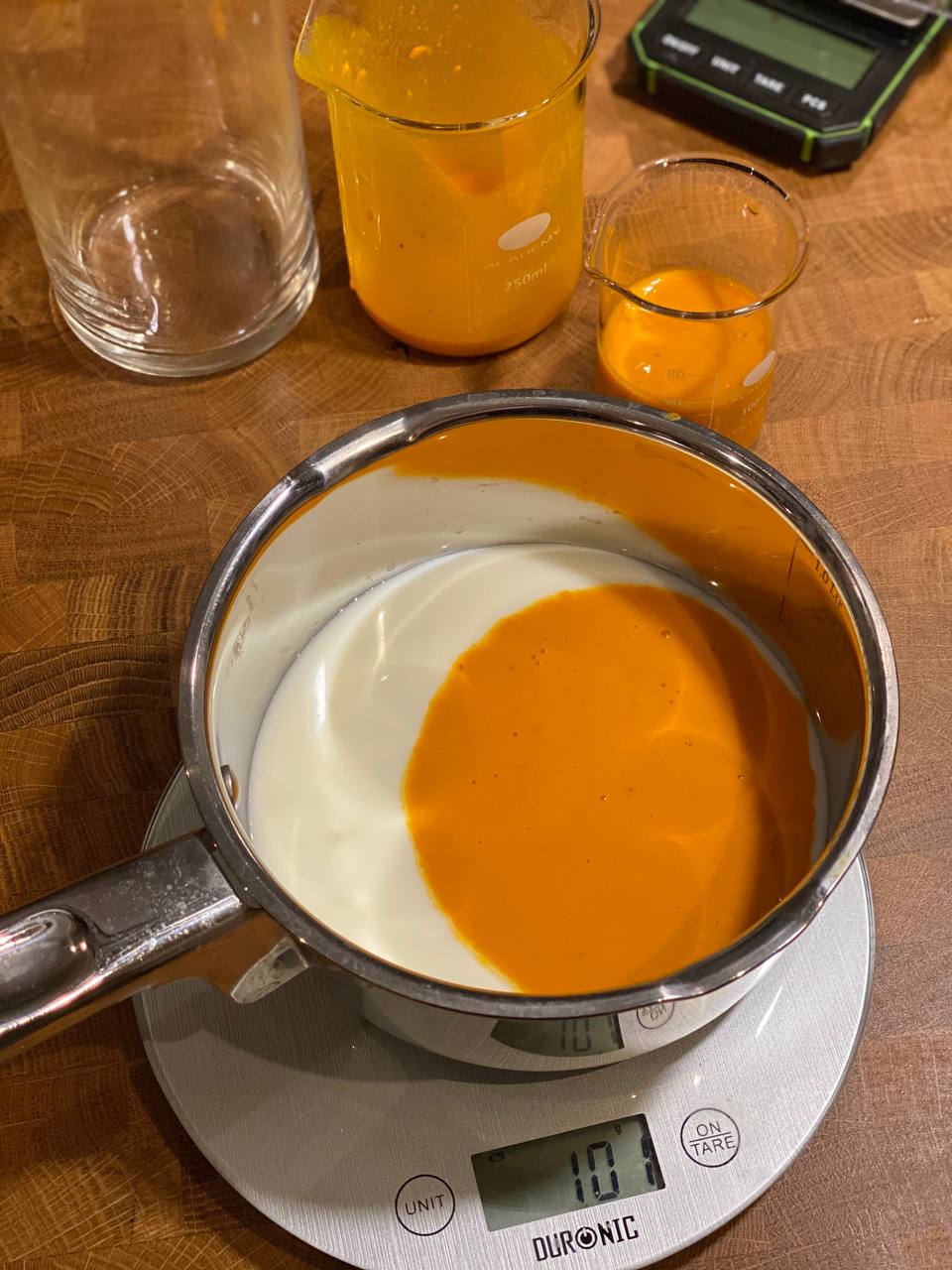
The filling is coated by a white chocolate ganache with sea-buckthorn juice:
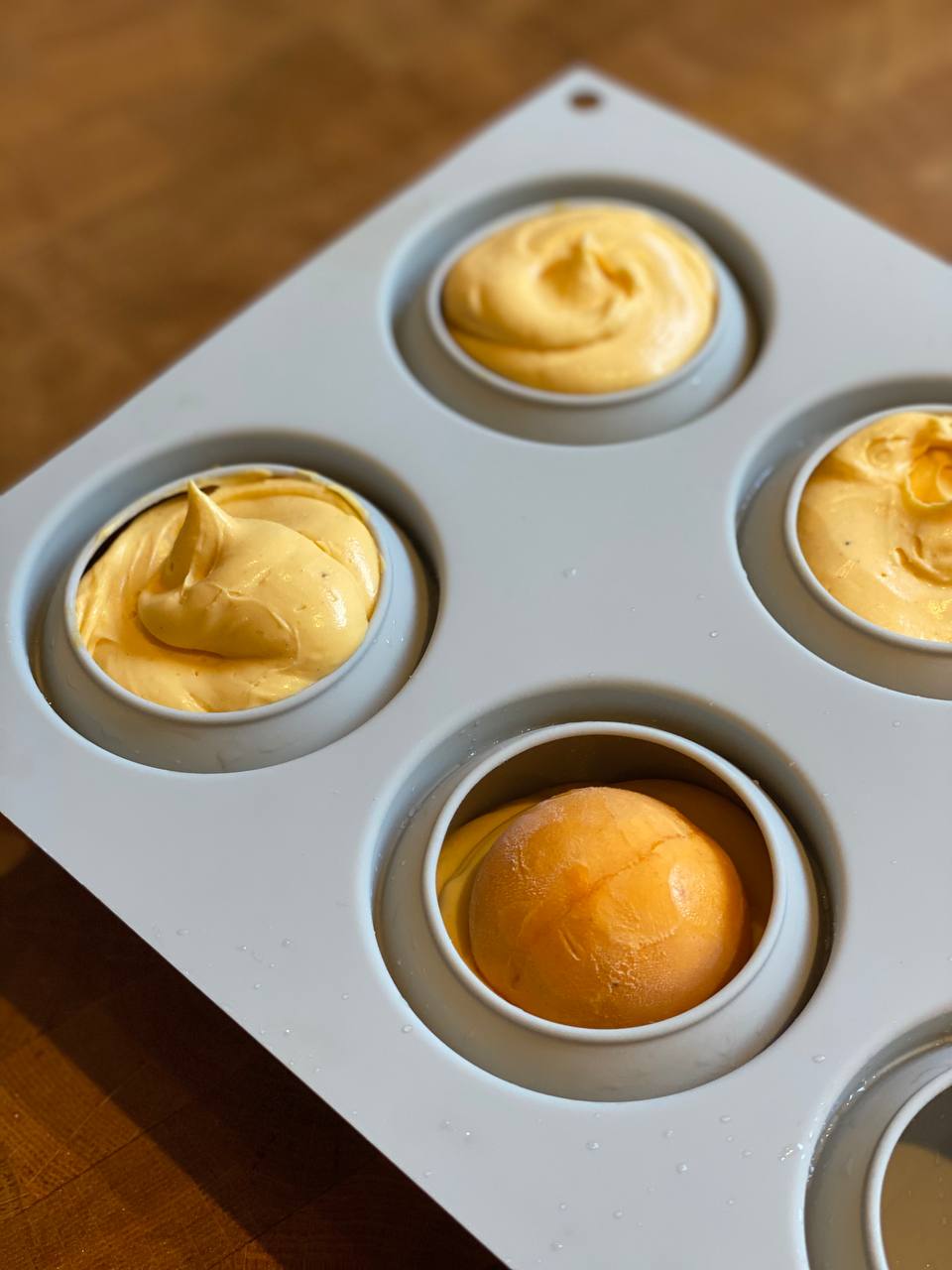
And then covered by a mirror glaze (I bet you can guess its flavour) and positioned over a freshly baked cinnamon crumble:
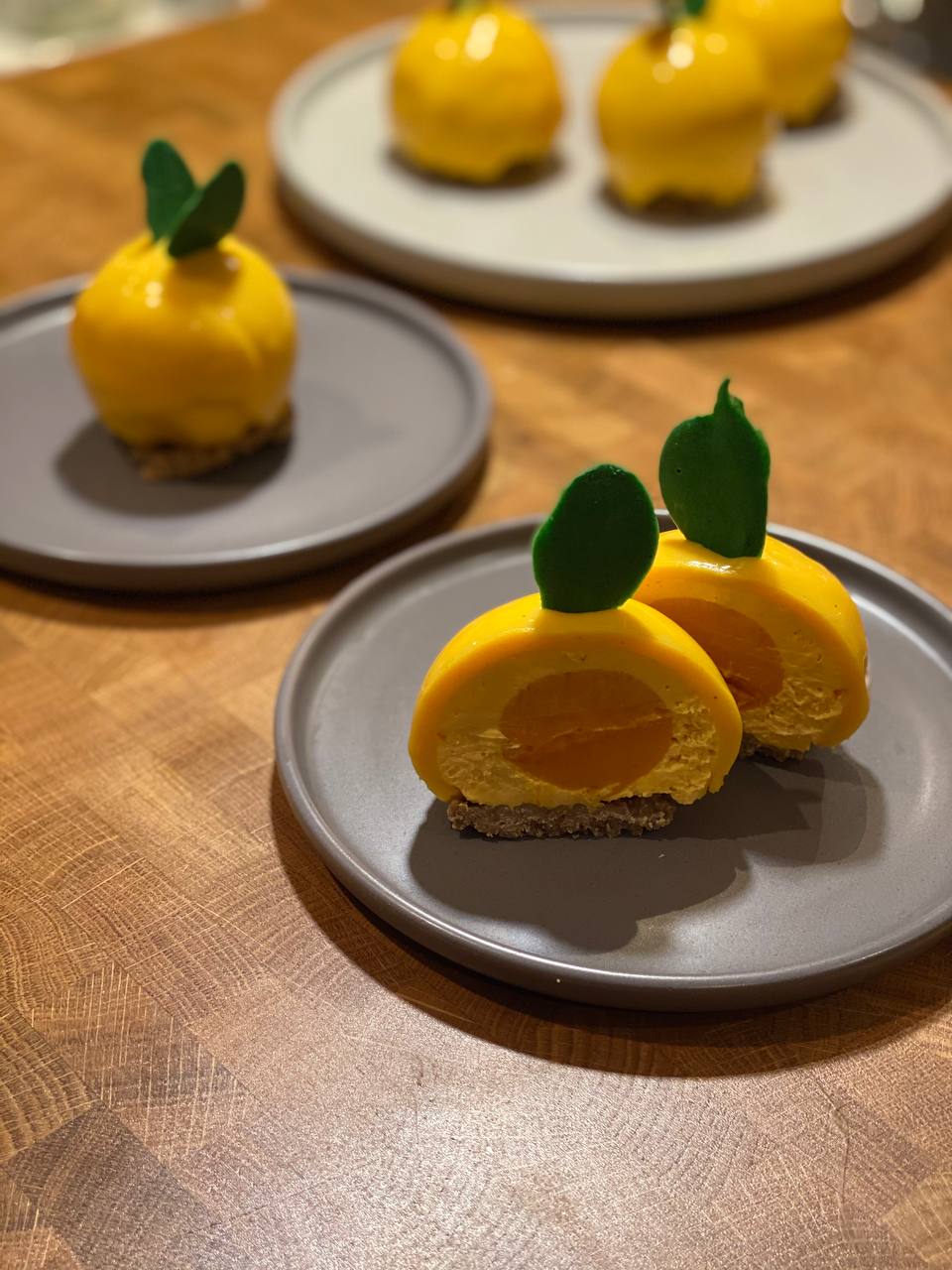
Matcha mousse cake ¶
I also had to finish some matcha coming to its best-by date, so did a spin-off of the same dessert but changed pretty much everything except the glaze.
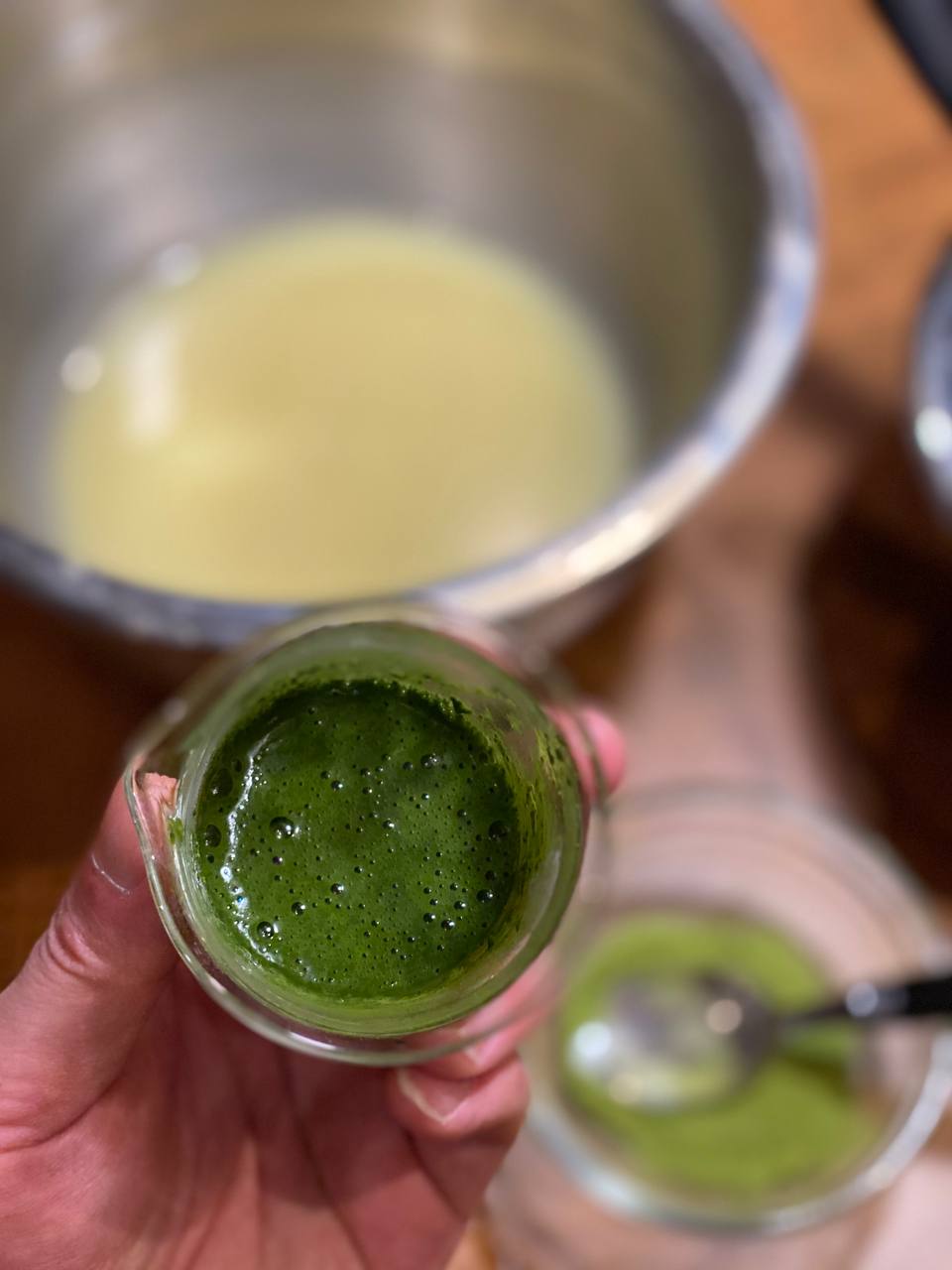
Apples are boiled in a honey-ginger syrup and then dipped into a cream cheese mousse whipped with some matcha paste.
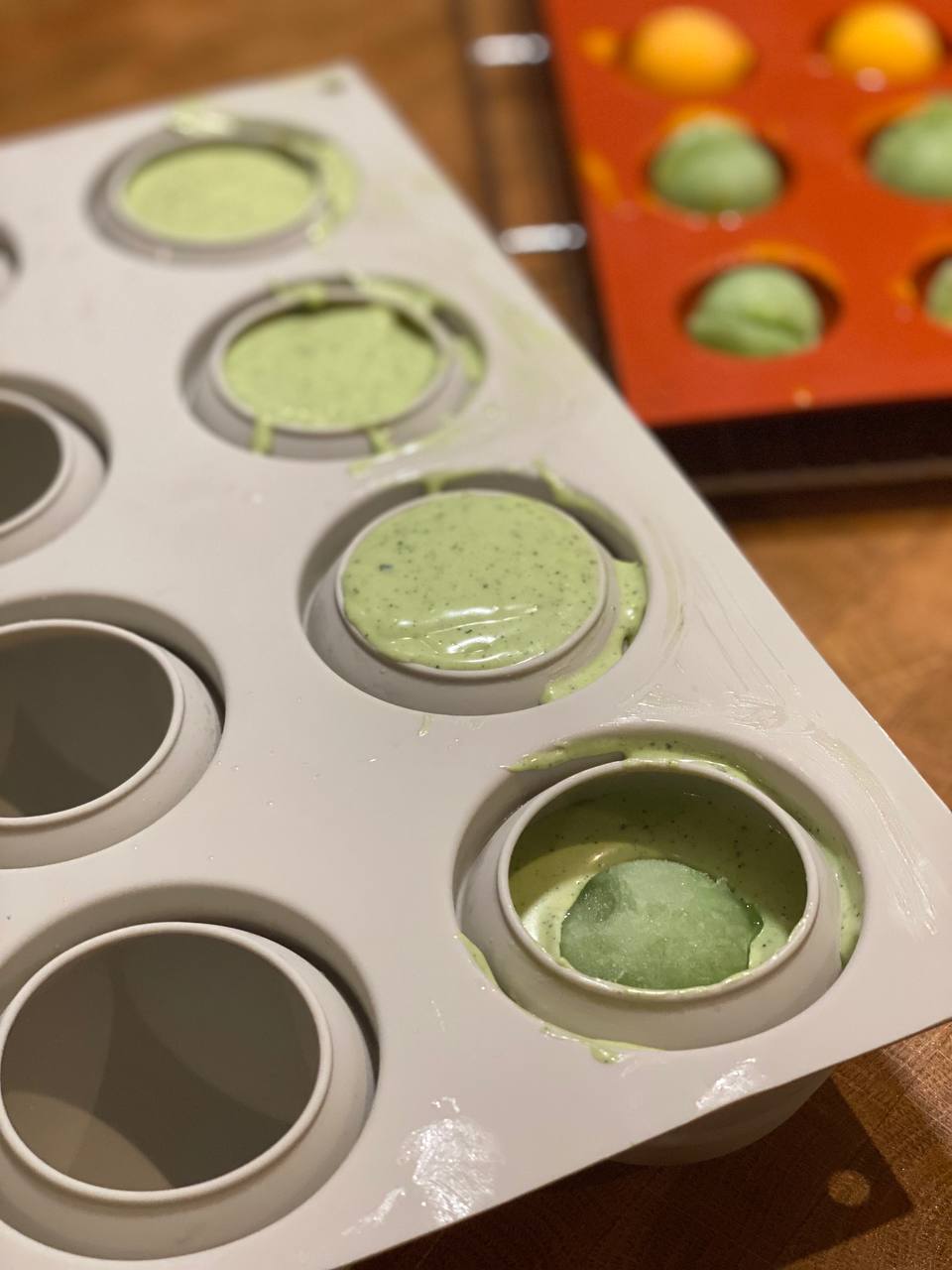
The glaze is matcha-based too, although given that the traditional matcha is impossible to dissolve, it gets not only the shine but also a fancy speckled pattern.
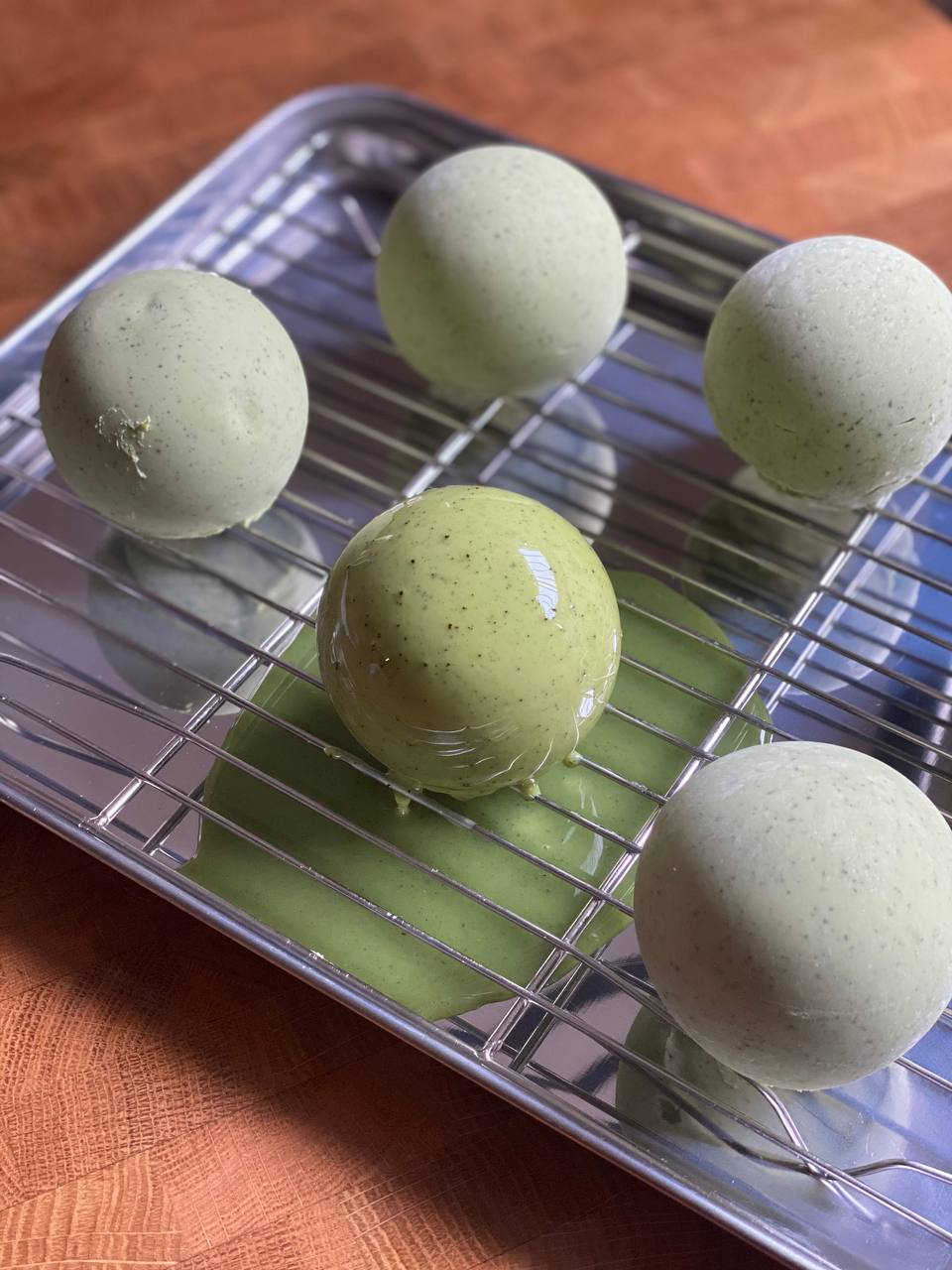
Then it's plated on a biscuit made with pistachio- and almond flours, garnished with a piece of dried cranberry, and sprinkled with some more pistachios.
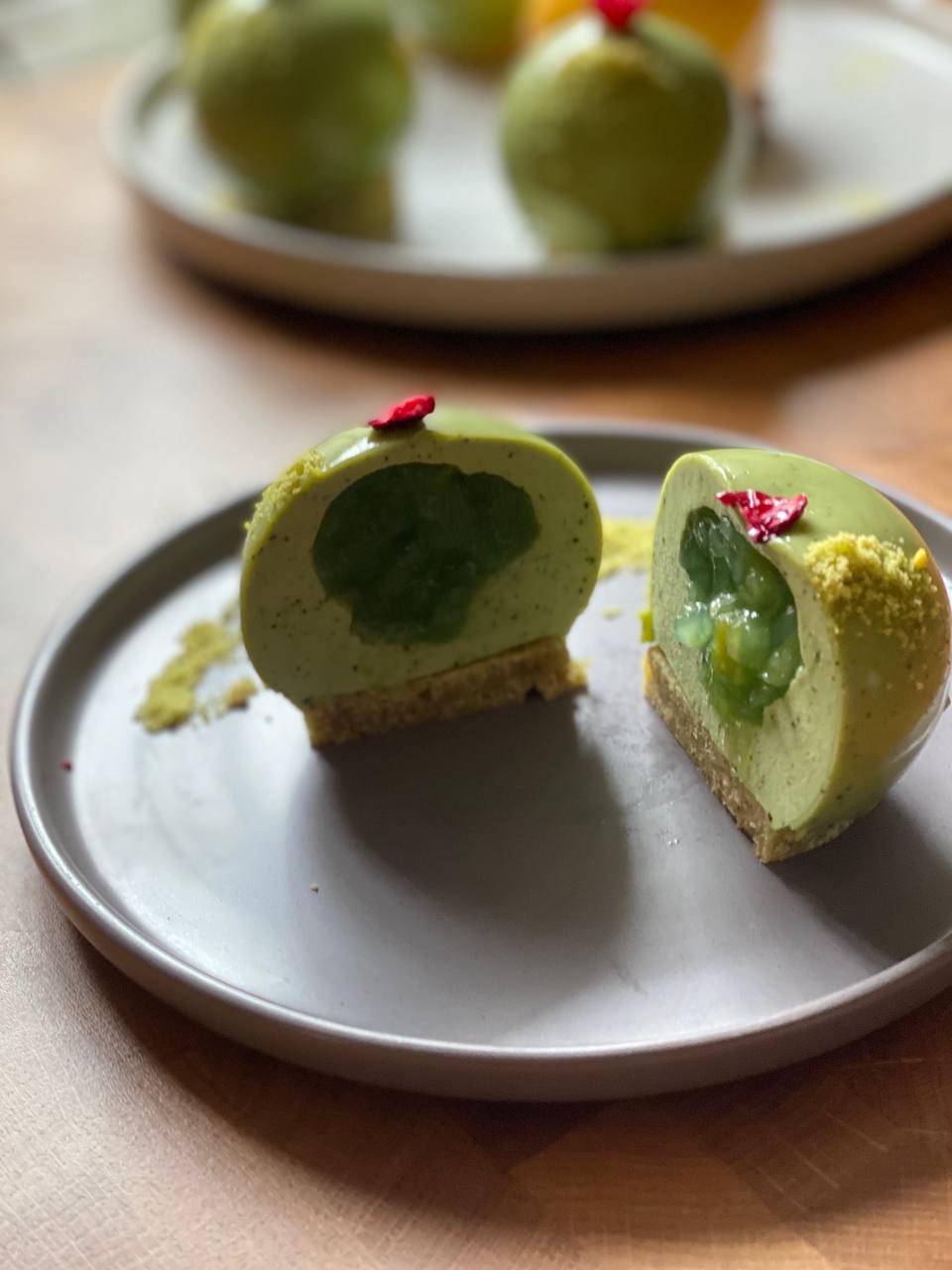
Both recipes were a fair amount of hussle but a plenty of fun too. And the outcome is both beautiful and delicious, but I think it's right about time I stop cooking sweets for at least a few weeks.
Things I enjoyed reading ¶
1. Excel Never Dies by @packym ¶
An awesome longread on the past, present, and future of Excel.
By being reactive, Excel allows for a kind of playful interactivity. You can play with inputs and toggles to a workbook, simulating different hypothetical scenarios. For the insatiability curious, it can be downright addictive. But more than anything, reactivity makes it easy to get very fast feedback, and the faster a system provides feedback, the easier it is to understand how that system works. Excel is designed to optimize the speed at which its users develop skill at operating it.
I also didn't expect it to be Turing complete.
I thought that it might be possible, given that even Brainfuck is Turing complete, but never actually let that idea to slip through.
2. The blissful political incorrectness of Soviet comedies by R J Markowski ¶
I grew up on Soviet comedies (even though I was born after the Soviet Union collapsed) and they are so much better than 99% of modern Russian movies.
I didn't really think of their political points until late school years, when we've started to explore the wonderful (not really) world of books censorship, and this article is a nice reminder of some of the best parts:
Churchill famously called Russia “a riddle wrapped in a mystery inside an enigma”. Watching these films and others like them, you feel some of the riddle solved. In their private lives – what the Soviets relished, laughed over, played at, longed for and drew the deepest satisfaction from – they were that most unimaginable thing of all. They were just like us.
3. When the Barbizon Gave Women Rooms of Their Own by @cncep ¶
In spite of the International Women's Day, a great story about one of the first and most famous American hotels only for women. It's opened almost a century ago and pretty much gave them a way to run from the past or plan the future.
The seven hundred or so women staying there on any given night had access to a swimming pool, a gymnasium, a library, lecture halls, soundproof music rooms, a rooftop garden, and first-floor businesses including a hairdresser, a dry cleaner, a pharmacy, and hosiery and millinery shops. There was a free afternoon tea for guests. Male visitors were barred from the residential floors.
Just to give you a perspective, in USSR in the same year women were being killed for taking off face-veils.
4. Raspberry PI for Kill Mosquitoes by Laser by Ildar Rakhmatulin ¶
That's almost a DIY weekend plan but here is a preprint of a complex to kill harmful insects with a laser.
We considered in detail the classification problems of mosquitoes in images. A recommendation is given for the implementation of this device based on a microcontroller for subsequent use as part of an unmanned aerial vehicle. Any harmful insects in the fields can be used as objects for control.
I dreamt of such a gadget for years; now I am just ready to pay to whoever brings a working prototype* to me first.
- It needs to be safe to use around ladybugs or my wife will ban the device and me from our garden.
5. When did writing in major newspapers become so bad? by Branko ¶
A funny take on the journalists' quality of writing in general, full of disclaimers and subjective assessment methods.
Maybe I’m not the target audience for 2021 New York Times. Maybe the medium is the message. Maybe the convoluted writing with indiscernible insider nods is intentional to keep people like me out. Or maybe historically prestigious publications should stop hiring former BuzzFeed writers.
I do agree though; the majority of narrated articles I read through on daily basis are... at best, questionable.
Is it just that they target someone else? Or did a cohort of writers-to-be somehow missed the same 101 class?
6. The Most-Used Mathematical Algorithm Idea in History by @stephen_wolfram ¶
An inspirational story about one of the greatest mathematicians of the previous century, and also a great introduction into the importance of algorithms:
Linear-feedback shift registers seem at first to have been prized for cryptography because of their long repetition periods. As it turns out, the mathematical analysis Sol used to find things like these periods also makes clear that such shift registers aren’t good for secure cryptography. But in the early days, they seemed pretty good—particularly compared to, say, successive rotor positions in an Enigma machine—and there’s been a persistent rumor that, for example, Soviet military cryptosystems were long based on them.
7. When The Prison Banned Board Games, We Played Chess In Our Minds by Harlin Pierce ¶
Albeit in grim circumstances, this is a story of almost a chess tournament happening in the heads of its participants, with spectators and judges present.
We started playing again, and the spaced out expressions on our faces captured the curiosity of a few inmates nearby. It was obvious we were doing something together, but we weren’t talking. Then Wally declared, “Knight captures on elephant 7, check!” And I said, “Man, that was a great move! I didn’t even see it!” The men looked at us like we were totally nuts for a split second then went about their business. It was hilarious to Wally and me. We loved transcending the literal barriers of time and space and challenging ourselves in a creative way.
8. Paying my bills with 'free' ebooks by @learn_byexample ¶
A paramount advice for fellow writers and a curious read on one's self-publishing journey.
Encouraged by the success, I made another important decision. Instead of starting another book, I took up the task of updating all my books. I alloted a month or two for this task, but it took me more than 4 months in the end. It wasn't that I had lot of new features to add. The feedback I had received over the past year and my own improving writing skills meant that I just couldn't help updating the books to the best of my abilities.
My latest attempt at writing a book paid off way better than expected (I got married) to publish a new one any time soon, but I vouch for sharing knowledge in all ways possible.
9. Treasure Out of the Bog by nrhiller ¶
A story about folks making furniture out of bog oak, 4000-year-old trees digged out of the ground, which is apparently very solid, really beautiful, and obviously expensive. Sometimes it is also very long (think 13 meters long).
Farmers hit the logs with expensive modern farming machinery, which causes damage, so they typically want to get rid of them. His friend Frank, whose father was the vicar in the nearby village of Methwold, was into photography and had shown him photos of bog oaks coming out of the fields. “They were very arty photographs,” Hamish remembers. He asked what happened to the trees. “They’re going on the fire,” Frank told him. Hamish decided he’d be interested in trying to process them. As he soon learned, “That is notoriously difficult.”
10. Notes from a year of building keyboards by @lynaghk ¶
As someone quite fascinated by mechanical keyboards (and a proud owner of one, although I still can't use it as my main one), I really enjoyed reading through this collection of learnings, notes, and ideas on building keyboards from scratch:
Although it would indeed be hilarious to sell a few thousand dollars of keyboards to Reddit randos, I knew that the challenges of a 50-unit production run — assembling the nth board, navigating international battery shipping rules in Chinese, setting up a Shopify to collect payments, etc., etc. — would be difficult to overcome without either a love of keyboards or a masochistic burning desire to trade in my intellectually satisfying and financially lucrative computing career for the world of pain that is high-mix, low-volume, fashion-driven manufacturing.
Things I didn't know last Tuesday ¶
1. Milton Keynes streets ¶
I heard a lot about the city (as it has a plenty of engineering positions despite being in the middle of nowhere), but never knew that it was designed to create a mythos and a meaning to the city.

Its main roads in the center are build in line with the sun on the Summer Solstice, so that the sun rises one end and sets the other, which is why they are called Midsummer, Avebury and Silbury Boulevard.
And the other two? We'll refer to our Anglo-Saxon heritage, because this is not an American new town... It's an English new town, in an English place, on a Common, where three Saxon Hundreds used to meet at that little mound behind the library.
2. Hagfish slime ¶
So there is this thing which looks (almost) like an eel:
Naturalists can tell the two apart because hagfish, unlike other fish, lack backbones (and, also, jaws). For everyone else, there’s an even easier method. “Look at the hand holding the fish,” the marine biologist Andrew Thaler once noted. “Is it completely covered in slime? Then, it’s a hagfish.”
And it has slime. And I bet you don't want to deal with it (no one does, really, but read the whole article as it goes into way more details).

(photo by Reuters)
3. It's illegal to charge for toilets in the USA ¶
There is this very popular essay about one of the first things States need to fix being public toilets, and then there is a reply to it, which actually explains why it's a problem in the first place... and that's quite logical but unexpected.
Activists decide free toilets are a human right, and successfully campaign to ban pay toilets. For a while, existing toilets are free. Within months, upkeep is ignored, attendants disappear, and the toilets become disgusting, dysfunctional and dangerous. Within a few years there are no toilets at all. Fast forward, and we have a resurgence of medieval diseases that come from people relieving themselves al fresco.
4. Vintage Market of Pugliano ¶
The market of Pugliano (also known as the market of Resina) is one of Italy’s best-stocked spots for secondhand clothes and military surplus items. It dates to 1944, when clothes and other objects were snatched from passing American convoys, then sold.
Apparently they still sell the original 1940s pieces.

5. Koreans predict personality by blood type ¶
Koreans use blood types in pretty much the same way Westerners use Zodiac signs.
Referred to as “warriors,” people with type O blood are often viewed as natural leaders and are sometimes natural athletes, too. Outgoing, energetic, and optimistic, Os speak their minds without reservation while maintaining a friendly and easygoing demeanor.
6. The Willy Wonka Candy Company ¶
Ah, that's a hilarious one.
Willy Wonka & the Chocolate Factory (1971) was produced by Quaker Oats.
They were going to release a chocolate bar, and then use the movie to promote it:
The Chicago Tribune reported that Quaker also insisted on the title being change to Willy Wonka and the Chocolate Factory, moving the story to place the focus more on the eccentric chocolate maker and less on Charlie, further putting their soon-to-be brand of Willy Wonka candies at the forefront
However they messed up its formula, so the chocolate bars were melting at room temperature, so when the movie was released, there was nothing to sell.
7. Beer taxation ¶
In the 17th century gin became the cheapest alcoholic beverage in the UK:
When the British raised taxes on beer in the 17th century, they inadvertently made gin the cheapest alcoholic beverage in the country. The ensuing widespread consumption of gin led to substantial alcoholism problems in Britain, with the death rate overtaking the birth rate during this period.
Also worth noting, that "substantial alcoholism problems" were not caused by people drinking gin instead of beer, but by the rapid industrialisation that moved people from farms to crowded cities and forced to work for almost nothing.
It's not gin's fault.
8. Talking with your hands alters the perception of your words ¶
Now I understand why Italian is considered to be a simple language to learn:
Participants were 20% more likely to hear and interpret the words being spoken when accompanied by a matching hand gesture, and 40% as likely to hear the wrong word when the gestures did not match.
Capisce?
9. Maxwell’s gambling demon ¶
This is like a Maxwell's demon, but better and fancier.
Now physicists have proposed a gambling version of the demon playing a slot machine, unable to control when the machine pays out (in terms of free energy available for work) but able to choose when to stop playing to maximize its "winnings." The research might one day lead to improved efficiency of microscopic heat engines and motors.
Sounds like fun, but also might make our future better.
10. Hershey Creamery Company ¶
Apparently Hershey's Ice Cream and Hershey's Chocolate are produced by two different companies.
In the same county.
In the same year.
By different Hershey's not related to each other.
The companies have had a tumultuous relationship marked by multiple lawsuits over trademark issues. In the mid-1990s, the companies settled their most recent legal battles out of court, with Hershey Creamery Company agreeing to add a disclaimer to its ice cream products to note that it is not affiliated with The Hershey Company.
Such a coincidence.
Book of the week ¶
While I've been trying to pair cooked apples with matcha powder, I've came across The elements of taste by Gray Kunz, which introduces a plenty of new ways to describe flavours (think "oceanic" or "starchy") just to come up with a handful of recipes:
To find the golden thread that truly unites a meal, you must pay attention to the transitions between dishes. A diva who begins a song on her highest note is like a chef who starts a meal with flavors that are too strong; there's nowhere to go. In planning a satisfying meal, that first impression is critical and so is the last. This is not to suggest that there is only one right way to plan a menu, but rather to encourage you to realize that for a chef, planning and preparation are the same as with any artist contemplating a performance.
That's one of those books which won't teach you how to cook, and probably won't make it to a shortlist I'd suggest to read to someone who just starts their journey in the kitchen, and most likely won't be a book you would search for on purpose.
However, once you start reading it, it's rather hard not to follow its ideas from now on.
Can't wait to apply them to our first cocktail menu of 2021.
Thank you and see you in a week! ¶
If you have any questions, or want to suggest a link for the next newsletter, please drop me a message on Twitter or reply to this email.
Cheers! 🍸